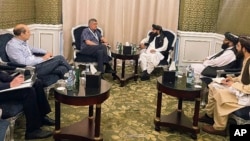The third round of U.N.-led talks to explore engagement with Afghanistan ended Monday without the Taliban making any reform pledges or winning concessions from the international community.
A few international organizations and special envoys for Afghanistan from nearly two dozen countries met with Taliban officials in Doha, Qatar, over two days. Rosemary DiCarlo, U.N. undersecretary-general for political and peacebuilding affairs, who presided over the event, told reporters the talks were "constructive" and "useful."
"This is the first time such a broad cross section of the international community and the de facto authorities have had the opportunity to hold such detailed discussions," DiCarlo said at the news conference after the event. "The discussions were frank and, I believe, useful."
U.N. Secretary-General Antonio Guterres initiated the "Doha process" a year ago.
While participants in the latest round of talks agreed to continue to engage, DiCarlo ruled out recognizing the de facto regime in Kabul unless the Taliban ended curbs on women's education and participation in public life.
Individual decisions
"Afghanistan cannot return to the international fold, or fully develop economically and socially, if it is deprived of the contributions and potential of half its population," the U.N. official said, adding that recognizing Taliban rule is also not the mandate of the global body but would be the decision of individual countries.
Although nearly 16 countries have embassies in Afghanistan, the global community has held back recognition of the Taliban government mainly because it is not inclusive and restricts the rights of women and girls in the country.
Though women's rights were not part of the official agenda, DiCarlo said participants raised the issue throughout their discussions and highlighted the need for an inclusive government during the two-day talks that focused on developing a private business sector and helping the Taliban sustain anti-narcotics gains.
"Afghanistan's messages reached all participant countries," Taliban delegation head Zabihullah Mujahid said in a post on social media platform X after the talks, adding that his country needed international cooperation.
Speaking to VOA on background, a Western diplomat said the Afghan delegation members were "very competent" and their technical know-how was "impressive."
Earlier, in a post on X, Mujahid, who is also the Taliban's chief spokesperson, claimed success.
"It was pledged that restriction on banking and economic avenues should be lifted," the post said.
While more than a hundred Taliban members face international sanctions, including financial sanctions, Afghanistan's banks do not. Experts say the country is disconnected from the global banking system and the dominant SWIFT financial transaction network because Western banks are wary of doing business with Afghan banks and exposing themselves to the reputational and financial risks they pose.
No new policy was introduced by any country, the Western diplomat privy to the talks said.
Separately, the U.S. froze $9.5 billion in Afghan central bank funds after the Taliban took control of the country in August 2021. In 2022, the Biden administration put $3.5 billion of that money in a Switzerland-based trust account called “Fund for the Afghan People,” which a board oversees. The remaining money remains locked. China, Russia, Pakistan and Iran are among countries that support unfreezing the funds.
'It was about understanding'
Speaking to reporters late Monday, Mujahid said the Taliban did not come expecting a breakthrough.
"It [the gathering] was about understanding each other's views," Mujahid said in response to a VOA question on the lack of progress on contentious issues between the Taliban and the West. "The achievement is that every country wants to support Afghanistan."
The U.N. is under fire from rights activists for its decision to exclude Afghan civil society activists to ensure the Taliban's participation in the global meeting. DiCarlo told reporters it was "a very tough, maybe impossible choice."
"We have a mandate to support this process [of talks]. Our belief was to bring the de facto authorities and special envoys together for direct talks," DiCarlo said. "Regrettably, the de facto authorities will not sit across the table with Afghan civil society in this format."
When asked what concessions the global body would be willing to make in the future to bring the Taliban back to the table, DiCarlo said she could not predict what conditions the de facto rulers might place.
"I could not speculate on that. What I can say is that they did come today. They were very engaged," she said.
At least three prominent Afghan women have declined the U.N.'s invitation to meet for talks in Doha on Tuesday.
"I respect their decision," DiCarlo said. "We're involved in a process now that is going to be a long-term process. This is not easy going forward. And we will continue to try to do the best we can. We won't make everybody happy."
Asked whether the Taliban would come back for more talks, Mujahid said it would depend on who and what were on the table.
"We will consider each meeting separately," he said. " We will look at its agenda and targets."
No date has been set for the next round of U.N.-led talks on Afghanistan.









